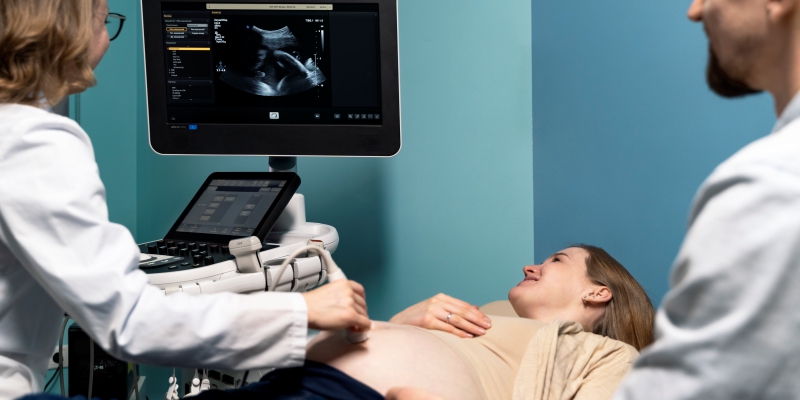
Fetal Heart Monitoring: Stages, Procedures, & Results

Author: Dr. Tejinder Kaur
MBBS, Diploma in Hospital Administration, Diploma of National Board training, Fellowship in Reproductive Medicine
Consultant: Obstetrician & Gynaecologist at Motherhood Hospital, Mohali
Fetal Heart Monitoring: Stages, Procedures, & Results
Introduction:
Fetal Heart Monitoring (FHM) is a crucial practice during pregnancy and childbirth, aimed at assessing the well-being of the fetus by tracking its heart rate and, sometimes, the uterine contractions of the mother. This practice becomes especially vital in a country like India where perinatal mortality rates are relatively high due to various risk factors like maternal infection and preterm birth. This article delves into the stages when FHM is performed, the procedures involved, and what the results could indicate.
Stages:
FHM is generally conducted during three primary stages:
- Prenatal Visits: Regular monitoring of the fetal heart rate during prenatal care appointments helps in the early detection of any irregularities.
- High-Risk Pregnancies: Pregnancies deemed high-risk due to conditions like preeclampsia or diabetes necessitate more frequent FHM.
- Labor and Delivery: Continuous monitoring during labor and delivery helps ensure the baby’s well-being and can alert healthcare providers to potential distress.
Procedures:
FHM can be carried out through various methods, each with its set of procedures:
- External Monitoring:
- Fetoscope: A manual method where a fetoscope, similar to a stethoscope, is used to listen to the baby’s heartbeat. Not used in clinical practice anymore.
- Handheld Doppler: Utilizes sound waves to measure the baby’s heart rate, displayed on a pocket handheld screen.
- Continuous Doppler: During labor, continuous monitoring is done using an ultrasound device held in place on the abdomen, providing a continuous readout of the baby’s heart rate alongside uterine contractions.
- Internal Monitoring:
- Conducted inside the uterus, a wire is attached to the baby’s head for continuous heart rate tracking, especially utilized when external monitoring results are unreliable or more precise monitoring is required.
Risks:
While generally safe, continuous electronic monitoring can restrict movement and potentially increase the chances of a cesarean section or delivery using vacuum devices or forceps. Internal monitoring carries risks like injury to the baby’s scalp, maternal infection, or transmission of infections like HIV from mother to baby.
Results & Follow-Up:
Results from FHM are usually shared by healthcare providers promptly. An abnormal heart rate or rhythm doesn’t always signify danger; however, persistent changes in heart rate could necessitate further monitoring, other tests, or in severe cases, an immediate cesarean section or assisted vaginal delivery.
At-Home Monitoring:
At-home fetal heart rate monitors and mobile apps are available but come with their set of drawbacks. They might not provide accurate results and could potentially lead to undue stress or a false sense of confidence. The FDA discourages the use of at-home Doppler devices due to the lack of medical necessity and the requirement of training to accurately use and interpret the devices.
Conclusion:
FHM is an invaluable tool for ensuring fetal well-being throughout pregnancy, especially during labor and delivery. While the procedures are largely safe, understanding the nuances, risks, and interpretations of FHM results is pivotal for expectant parents to ensure a healthy pregnancy and childbirth experience.
If you are on the verge of menopause or are going through menopause along with urinary symptoms, consult Dr Tejinder Kaur at the Motherhood Hospitals.
At Motherhood Hospitals, we have a team of experienced supers specialists backed by the latest infrastructure and facilities. We have the best gynecologist in Mohali. We are experts in handling complex deliveries, gynecological, and other surgeries including a range of laparoscopic surgeries.
Do make an appointment with the best woman care hospital in Mohali at a center closest to you. Meet with our doctors who will carry out the required investigations, diagnose the issue, and recommend the most appropriate treatment, enabling you to lead an active life.
If you wish to get in touch with Dr. Tejinder Kaur, please book your appointment here.
Related Blogs

Understanding Gestational Diabetes: Insights from Dr Shruthi Kalagara
Read More
Urinary Tract Infection (UTI) in Pregnancy
Read More
Early Pregnancy Care for New Pregnant Women: Expert Advice | Motherhood Hospitals
Read More
Body Positivity Tips Post C Section (Cesarean Delivery)
Read More
Vaginoplasty: Procedure, Cost, Risks & Benefits, Recovery
Read More
The Digital Dilemma: Exploring the Medical Implications of Technology on Child Development
Read More
How To Relieve Menstrual Cramps? - 8 Simple Tips
Read More
Benefits of Consuming Folic Acid Tablets For Pregnancy/During Pregnancy
Read More
Navigating Radiology: Ensuring Safe Imaging During Pregnancy
Read More
Navigating Radiological Tests During Pregnancy: Ensuring Safety for Mother and Child
Read MoreRequest A Call Back
Leave a Comment:
View Comments
Previous
Next
HELLO,
Stay update don our latest packages, offer, news, new launches, and more. Enter your email to subscribe to our news letter


 Toll Free Number
Toll Free Number








No comment yet, add your voice below!